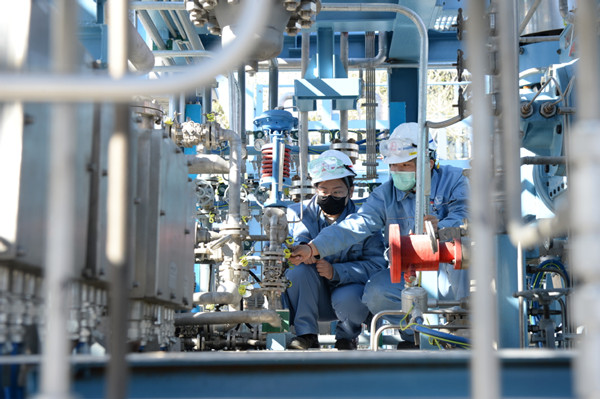Sinopec Charts Big Plans in Clean Energy

Technicians check distribution equipment at a hydrogen facility of Sinopec Yanshan Petrochemical Co. [Photo by Hu Qingming/For China Daily]
State oil giant to build major hydrogen network to achieve emission goals
As China's hydrogen fuel price is set to become competitive over petroleum by 2030, domestic oil giant China Petroleum and Chemical Corp vows to roll out the world's biggest hydrogen network with continuous investment in clean energy.
The world's top refiner by capacity, the company, also known as Sinopec, aims to massively expand its hydrogen refueling network and become China's top hydrogen supplier, as the State-owned oil giant, which owns the biggest domestic fuel transportation network and a sales network of over 30,000 retail stations, attempts to carve out a role in China's green transition.
The company's recent study showed China's hydrogen-powered fuel cell electric vehicles are expected to be cost-competitive in 2030 compared with gasoline-fueled vehicles.
Thanks to advances in technologies, the cost for green hydrogen or renewables-based hydrogen will be further lowered and hydrogen-powered trucks' fuel cost will also be competitive against that of diesel-fueled ones by 2025, the company said.
Sinopec vowed to build the largest hydrogen refueling network in the world with 1,000 stations by 2025, compared with only 100 nationwide by the end of last year. The company had equipped 31 stations with hydrogen refilling capacities by September, it said.
Energy consultancy Wood Mackenzie declared the 2020s the decade of hydrogen, saying it is part of a long-term climate strategy for many governments. BloombergNEF expects hydrogen to play a valuable role decarbonizing long-haul, heavy-payload trucks.
"We believe by 2031, it will be cheaper for the long-haul, heavy-payload trucks to run using hydrogen fuel cells than diesel engines," said Mi Siyi, an analyst with BloombergNEF.
Sinopec launched a hydrogen supply center in Shanghai in late September, where hydrogen was offered at around 40 yuan ($6.27) per kilogram-a price almost equivalent to using gasoline in a car, according to Shanghai Petrochemical, despite the fact the weak hydrogen refueling service network restricts the center to supply only to public transport vehicles. The company is also optimistic in the long run. According to its plan for the 2021-25 period, it will invest 30 billion yuan in hydrogen-related businesses, including hydrogen refueling stations and hydrogen storage facility construction, all of which are believed to achieve a carbon dioxide reduction of more than 10 million metric tons.
The company also plans to build 5,000 charging and battery swap stations and 7,000 distributed photovoltaic power generation sites during the five-year plan period. It has already built 21 hydrogen refueling stations in 14 provincial regions and cities, including Guangdong, Shanghai and Hainan.
In China, spurred by the nation's carbon goals, governments at different levels were all motivated to explore the hydrogen industry, which has been inked in the country's 14th Five-Year Plan (2021-25). More than 40 Chinese cities have introduced policies to promote the development of hydrogen energy.
Hydrogen fuel cell vehicles, on the other hand, are also expected to experience a rapid expansion as China put forward its dual carbon goals of peaking carbon emissions by 2030 and achieving carbon neutrality by 2060. China's ambition to achieve carbon neutrality is also urging major emitting sectors to take serious action, said Mi.
State Power Investment Corp Ltd, together with CRRC Datong Co Ltd, launched the first China-developed hydrogen fuel cell hybrid locomotive for coal transport in late October in the Inner Mongolia autonomous region, which is expected to cut carbon emissions by about 96,000 tons a year on the 627-kilometer coal railway compared with traditional diesel locomotives.
The new-energy locomotive, which has zero pollution and only emits water, has broad market prospects for use in large factories, mines and ports, the company said.
Liu Wei, secretary-general of the National Alliance of Hydrogen and Fuel Cell, said China's ambition to achieve carbon peak by 2030 and carbon neutrality by 2060 is a driving force for the development of the hydrogen energy industry. The alliance estimated China's demand for hydrogen energy will reach 60 million tons by 2050 and will reduce 700 million tons of carbon emissions by then.



